




sure that many, if not all, of our readers will be familiar with
of discomfort, anger and sadness as a result of
in a non-vegan world. In this issue you can find an article which introduces the concept of ‘vystopia’, a word coined by psychologist Clare Mann to describe this precise emotional state and, more importantly, steps you can take to address it.
We have also included an interview with pro skater Nils Jansons, who is pictured on the cover. Writer and

Lanyon Willmott shares her insight on
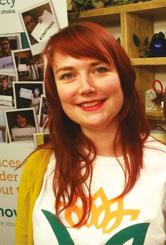
plant-
based art materials. If you’re looking for ways to view animals in their natural habitats, our article on badger watching is sure to inspire you.
You can also find three delicious recipes from Nistisima: The Secret to Delicious Vegan Cooking from the Mediterranean and Beyond. If you try any of them out, please do let us know!
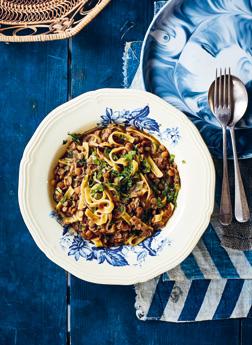
Following feedback from our members at the last AGM, from issue 4 this year we will be featuring more in-depth, thought-provoking content in the magazine, as well as more coverage of the wider vegan movement. Please email editor@vegansociety.com if you have a topic you are particularly keen to see included.
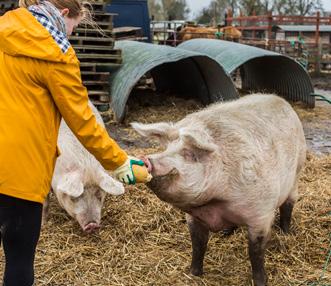 Orde, Editor
Orde, Editor
From the CEO
Editor Elena Orde Designer Violeta Pereira
Cover image Kaspars Alksnis Print seacourt.net
Staff
Dylan Adams
Charlotte Adcroft
Chantelle Adkins
Sabrina Ahmed
Nina Anderson
John Andrews
Emily Austin
Amanda Baker
Shell Barrett
Paul Beaumont
Francesca Blyth
Caroline Bolton Rachel Bowcutt
Jodie Brown
Samantha Calvert
Joanna Cassin
Gabriela Chalkia
Laura Chepner
Jodie Coghill
Charis Collier
Hannah Coyne Beth Dandy Adam Duncan
Ericka Durgahee
Katharina Eist
Lorna Fenwick-McLaren
Claire Fittes
Joseph Flynn
Joel Foster Finn Katharine Grant Kaya Gromocki
Steve Hamon Rich Hardy
Maria Hinis
Stephanie Hitchen
David Hitchen
Brittany Holt
Alex Huntley
Phaedra Johnstone
Jennifer Jones
Francine Jordan Gurminder Kenth
Stephane Kotto
Jane Langan
Mirrin Lewis Zoe Lomas
Harriet Macintosh
Liliana Maoudis
Alex Markland
Ella Marshall
Chloe Martin
Eleanor McGregor Kamala Middleton Amit Mohan
Theresa Murphy
Timothy Newthorpe
Claire Ogley
Elena Orde
Emma Parrott
Violeta Pereira
Katarzyna Petruk
Cheryl Pierpoint
Serin Price
Nishat Rahman Nora Rodriguez Valls
Jeanette Rowley Sheridan Rudge Heather Russell Andrea Rymer
Stephen Sanders
Laura Scougall Isabel Skertchly-Murray Maisie Stedman
Clare Straughan Samantha Thackray Cat Thompson Chantal Tomlinson
Amelia Wallage
Louisianna Waring Lauren Williams
Jemma Williams
Lisa Williams
Danielle Wood Council
Salim
I hope that this edition of The Vegan finds you all well. For those of you who are not aware, at the beginning of July
I was very pleased to take on the role of CEO of The Vegan Society. This follows on from my roles within the Business Development Team, where I most recently served as Head of Commercial Services.
Since joining The Vegan Society in 2020, I have thoroughly enjoyed working within the Business Development Team, supporting the team in securing new partnership deals, and overseeing the registration of the Vegan Trademark’s 60,000th product.
My journey into veganism started when I became pescatarian for health and fitness reasons. After a while I had a ‘lightbulb’ moment and understood that it wasn’t about me, but the animals. I became vegan overnight, and my only regret is not going vegan earlier.
This is an exciting time for veganism, and I look forward to making further progress for its advancement together with all of those who support The Vegan Society. Working here for the last 21 months has also made me aware of the vital role the society has played in the past decades, and what still needs to be done to promote veganism. I relish the chance to collaborate with, lead, and be part of the team that will continue to deliver this important progress.
The Vegan Society has faced a number of challenges in recent years. Tangible progress has been made, and there is a firm commitment from the Trustees to fully implement and embed all of the necessary improvements.
Thank you to all who attended our AGM in May, and congratulations to our new and remaining Trustees. You can find out about motions passed, and the newest members of Council, on page 27.
Steve Hamon, CEO
The Vegan Society cares deeply about the future of our planet and all those we share it with. We are committed to operating as a responsible, sustainable organisation which means we are conscious of the social, economic and environmental impact in all that we do. With this in mind, we are very pleased to announce that we are now working with Seacourt to print and distribute The Vegan Seacourt are the UK’s leading environmental printing company and work closely with their clients to ensure that all material is produced with the lightest environmental footprint possible. In fact:
• Their presses are 100% free from water, alcohol and harmful chemicals
• They use inks which are vegan and free from volatile organic compounds
• They are powered by 100% renewable energy
• They send zero waste to landfill
As a result, they are Net Positive (beyond carbon neutral including the entire supply chain). Every time they produce a piece of print, they take responsibility for more carbon than they are generating – what they call Planet Positive Printing
We hope you enjoy reading this issue, knowing that it has been produced in line with ethical, sustainable principles.
Donald
expensive – has been a priority of ours. Many people view cost as a barrier to veganism, so for the second phase of the campaign, we have highlighted how it is still cheaper to follow healthy eating guidelines by choosing sources of plant protein over animal-derived proteins through our updated cost comparison research. We have aimed to provide practical tips and support for vegans on a budget, through a new series of blogs.
We have included a host of budgetfriendly recipes for meals that won’t compromise on flavour and comfort, and have collaborated with familiar influencers, such as The Vegan Punks, for an upcoming video series with recipe ideas for meals under £1. Be sure to keep an eye out on our website and social media platforms for the new content!

Future Normal is The Vegan Society’s animal rights campaign. Through Future Normal we engage with non-vegans who identify as animal lovers, encouraging them to make more compassionate choices.
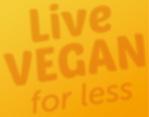
This autumn we have some exciting developments to share with you, including a new name for the campaign. Following

Our Research Team recently launched On the Pulse, a monthly webinar series in which one of our research volunteers presents on their topic of expertise. The events are available to everyone and include a presentation and a question-and-answer session.
On the Pulse has featured some fantastic speakers recently, covering an introduction to vegan sociology, the ethics of lab-grown meat and the position of animals in relation to market ideologies. To find future events, keep an eye on our social media pages.
We have published a new report entitled Vegan Vehicles: The Future of Cars. The report found that 70% of UK drivers said they were interested in purchasing a car that is proven to be entirely animalfree, while 75% want to see the removal of animal products from cars and other vehicles. The report is a valuable resource for people working in car manufacturing who are looking for evidence to inform ethical industry developments, as well as consumers looking to make ethical decisions. The report was received well by the press, being picked up by Totally Vegan Buzz, politics.co.uk Vegan Food and Living, among others.

Calling all fundraisers – The Vegan
hosting a virtual quiz, to running in a sponsored race or simply setting up a JustGiving page, the ways in which you can help the society are endless. Whatever the challenge, we would be honoured to cheer you along on your fundraising journey.
To discover more fundraising possibilities, please visit our website to see how you can get involved. If you would like to have a chat about ways in which you can support the society, feel free to contact Fundraising and Partnerships Assistant Theresa Murphy via fundraising@vegansociety.com or call +44(0) 121 507 9987.
he Vegan Society’s International Rights Network exists to protect and further the rights of vegans, comprising legal experts from across the world. A member of our legal network was recently involved in a case in which a vegan German soldier was not provided with suitable food. With our support, the soldier successfully sued the German army for
This is a landmark case because the court ruled that veganism is an issue for freedom of conscience rights under the German Constitution. This ruling brings protection for vegans in Germany close to that available under
 Our latest research report is entitled Vegan Vehicles: The Future of Cars
Our latest research report is entitled Vegan Vehicles: The Future of Cars
Our Education Network (EN) has created a brand-new resource entitled Supporting Veganism in Education: A Guide for Educators. The guide contains information on how to accommodate the needs of vegans in all educational settings, including practical advice on how to be veganinclusive in supporting learners and staff. Visit vegansociety.com/lifestyle/vegan-inclusiveeducation to find the guide.
We are very excited to announce that we will be holding the first ever Veganism in Education Conference, at which members of the EN and International Rights Network will address the challenges to veganinclusive education. We welcome guest speakers from the education sector to submit presentations ahead of the conference, which takes place on 1 October in Liverpool, UK. Please contact vegansociety.com professional interested in joining the EN or contributing to the conference.

Please sign our petition requiring schools to provide a vegan meal option every day. We are asking our government to follow Portugal’s lead and mandate a hot, nutritious vegan option on school menus daily. Find the petition at petition.parliament.uk/petitions/608670 or linked via our
social media, and please do encourage your friends and family to also sign by 17 August.
Do you follow the latest blogs on our website? We’ve shared some fantastic ones recently, including a blog for Pride Month featuring interviews with vegan professionals
We have also shared a number of blogs featuring products registered with the Vegan Trademark. The latest include vegan gardening products, vegan sun care and our new travel guide, kicking off with a guide to German beer gardens. vegansociety.com/blog or follow our social media channels to ensure you

ill your legacy be a vegan world? Leaving a gift in your will to The Vegan Society
helps create a more peaceful, sustainable and compassionate world for generations to come. If you are interested in learning more about how you can leave a gift to the society, please download our new legacy booklet when you visit the ‘Give in your Will’ area of our website. For more information email legacies@vegansociety.com or contact us on 0121 507 9987.
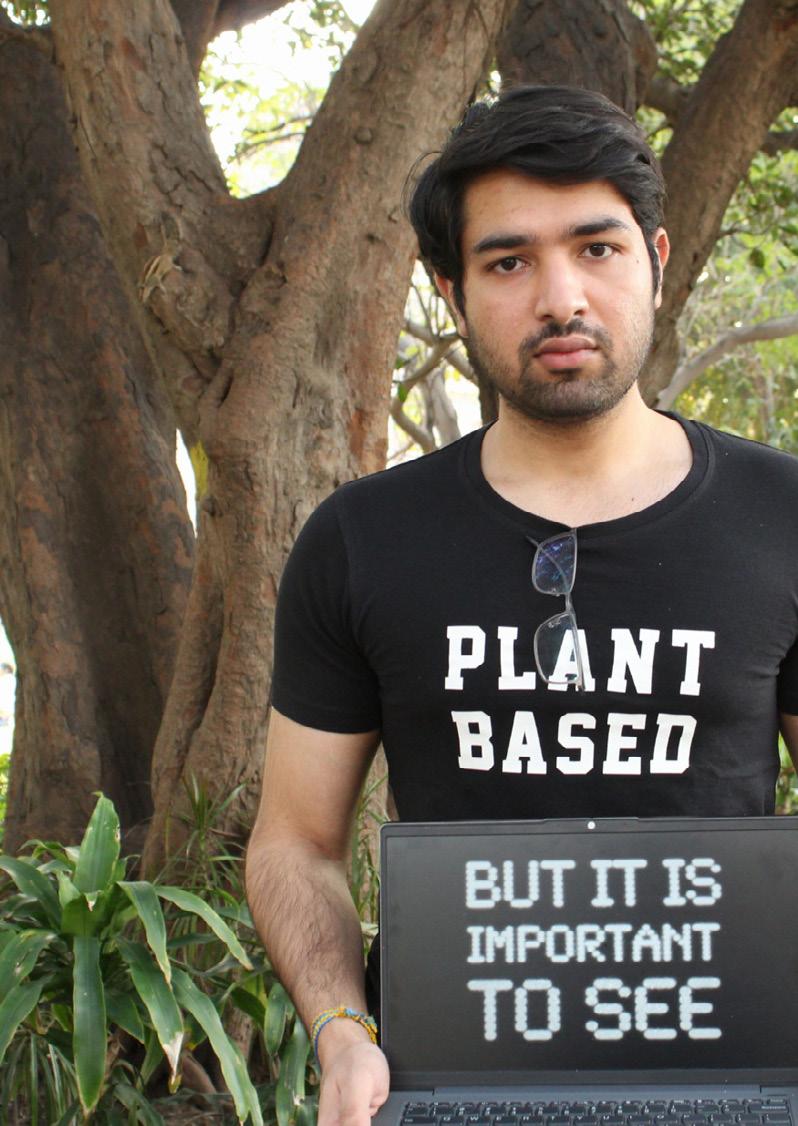 Ishaan has found his activism overwhelming in the past
Ishaan has found his activism overwhelming in the past
Upon learning about veganism, Mihir was excited to align his values with his actions. Being a lifelong animal advocate and having grown up with two dogs, he hoped his friends and family would agree with his vegan principles.
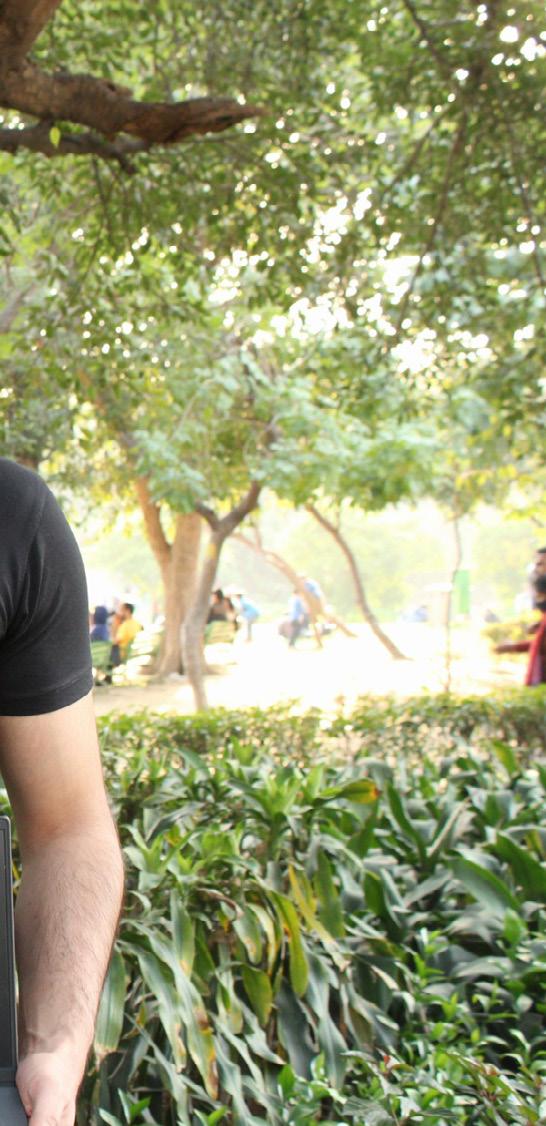
However, just a few weeks into his transition to veganism, Mihir realised that his friends and family did not want to see his point of view, despite the fact that they too shared his affection for other animals. He tried hard to get them to care but his efforts failed. The actions of his friends and family, who he felt valued taste and convenience over compassion, were reminders of the suffering endured by other animals.
Mihir had never before experienced this kind of distress as a result of his compassion for animals. His instinct was to neglect his own suffering by dismissing it as “nothing compared to what animals suffer.” He then came across the term “compassion fatigue” at an activist training course, which came somewhat close to describing what he was feeling.
But compassion fatigue is not a completely precise term to describe many vegans’ experiences. “Fatigue can come and go away after one takes some time off. But for vegans, there is no time off per se from the awareness of the mass scale exploitation of animals,” says vegan psychologist, Clare Mann.
Clare Mann propounded the term vystopia which she defines as “an existential crisis experienced by vegans, arising out of an awareness of the trance-like collusion with a dystopian world.” Clare says that the distress had to be differentiated from anxiety and depression alone. Having a word for the unique pain that vegans experience makes a statement to the world about the trauma that sprouts from its collusion in the horrors that non-human animals go through.
Clare further elaborates that it is a form of distress not experienced by other present-day activists fighting for causes such as women’s rights and children’s rights. This is because
Fatigue can come and go away after one takes some time off. But for vegans, there is no time off per se from the awareness of the mass scale exploitation of animals.
Coping with the distress of living in a non-vegan world
society at large recognises the injustices being tackled as worthy causes.
Some symptoms of vystopia are anxiety, depression, PTSD, self-admonishment, persistent nightmares from watching graphic videos, feelings of hatred towards the human race (misanthropy), not being able to see the good in people, losing interest in previously enjoyable activities, feeling alienated or disconnected from friends and family and feelings of guilt. When the mentioned symptoms become an obstacle in day-to-day functioning, it is important to seek professional help.
Clare is optimistic about the concept of vystopia catching on with psychologists across the globe. She says, “Although we do have a dearth of vegan psychologists, psychologists are being trained to help clients struggling with vystopia.” Recently, Clare was a guest speaker at a training programme themed around vystopia which took place in Brazil, which was attended by over 50 psychologists, counsellors and therapists.
When asked about a cure for vystopia, Clare says “The anguish of knowing what happens to animals behind closed doors does not go away, but can be redirected into positive action for change. I have a friend who has been vegan for 45 years. Redirecting his energy to advocate for a vegan world has helped him in not only managing his vystopia, but also given him a sense of fulfilment in the company of fellow vegans who also take action to create a vegan world.”
Clare believes that the following can help someone struggling to relate to the non-vegans in their life:
Unless you were lucky enough to be raised vegan, remembering this can help us to understand that people have the potential to be good and kind, and to change their actions to becoming more compassionate.
At a march, Clare reports having interacted with a woman who was appalled at what is happening to animals behind closed doors. “I advocated veganism as a solution to the problem, but the woman became very distressed and resistant to the idea,” Clare says. “I enquired about her feelings on the idea and she cited how being married into an Italian family as a non-Italian already gets her so much of the family’s resentment for not being able to cook authentic Italian food. She felt that if she were to go vegan or try to convince them to do the same, it would make things much more difficult.”
3 Develop effective communication strategies that can result into a “chink of consciousness” for the non-vegan
Clare says, “I find it very effective to ask questions whenever someone is asking me about veganism. For instance, the next time someone asks why you are vegan, you can reply
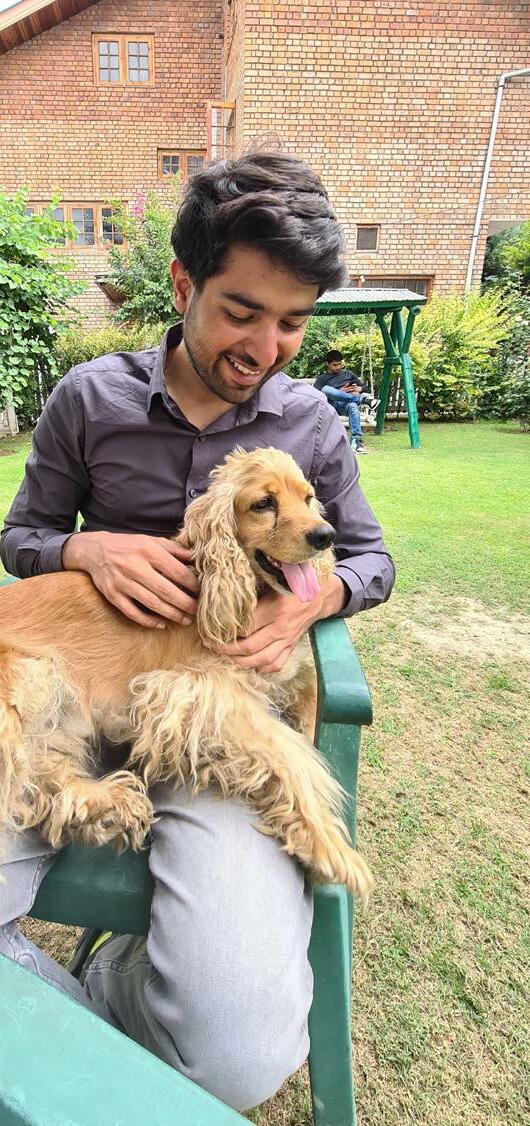
activism is
by asking them what they believe veganism is. Based on their answer you will be able to respond in a way that helps connect to them. For example, if they were to answer ‘veganism is an extreme form of vegetarianism’, it helps you understand that vegetarianism is reasonable to them and then you can mould your response to talk about the cons of consuming dairy.”
Clare says, “I was once walking with my rescue dogs and a woman walking across with a McDonald’s burger approached and started petting the dogs while claiming she loves animals. I smilingly said, “It’s always nice to meet vegans,” to which she replied, “Oh, I’m not vegan” and then I asked “Oh, how does that work?”
Ishaan is an animal rights activist in India, where cows are considered holy yet exploited by the dairy industry. Ishaan started advocating for animal rights within his friend circle before expanding to social media, and has now had his efforts covered by national media.
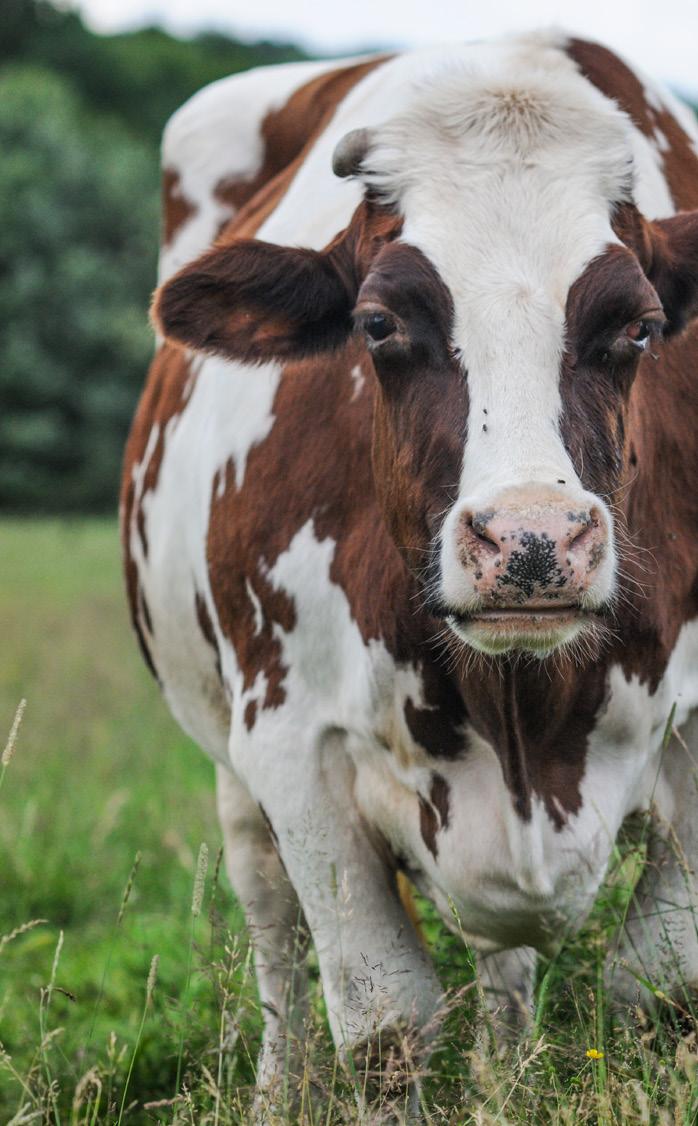
When Ishaan first started advocating for animals, he received dismissal and had to change his strategies. “It certainly was a cause of anguish and I even lost a few friends on the way. Eventually, some became receptive and cared enough to go vegan,” he says.
Yet Ishaan continues to hold a positive view of humanity, and has been able to mentally separate actions from individuals. “I acknowledge that there are many layers to the transition to veganism,” he says. “For instance, someone might be enthusiastic about going vegan but still under the care of their guardians, and not in control of their diet."
On being asked if activism ever became a source of burn out for him, Ishaan says, “As an activist, I have to be quite active on social media and I often come across hateful comments. It used to be very overwhelming dealing with them, but now I have realised that the fulfilment I get from activism is far greater than a few negative voices.”
For Clare’s resources, including her book on vystopia, a 30-day course and information on finding suitable counselling, visit veganpsychologist.com
 By Heena Malhotra
By Heena Malhotra
Delicious vegan food from the Mediterranean and beyond
‘Nistisima’ means fasting food – food eaten during Lent and other times of fasting observed by those of Orthodox faith. Mostly this involves giving up meat and dairy and instead using vegetables, pulses and grains to create easy, delicious dishes that all just
In this extract you can find three delicious recipes selected from Georgina Hayden’s new book.
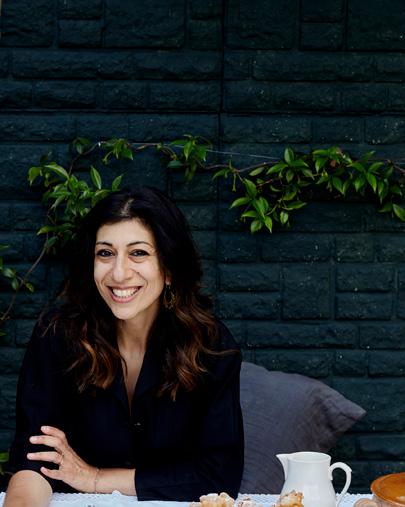
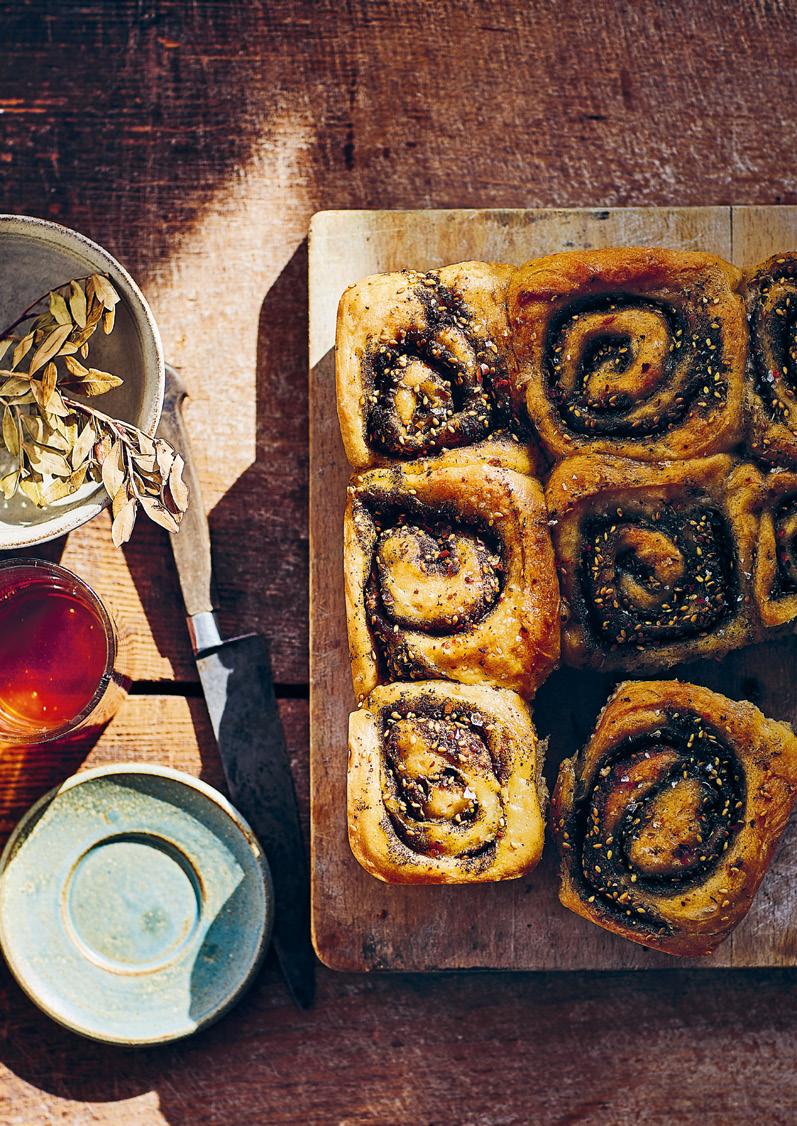
1 tbsp caster sugar
1 x 7 g sachet of fast-action dried yeast
500 g strong white bread flour, plus extra for dusting
¾ tsp fine sea salt
125 ml extra virgin olive oil, plus extra for greasing
6 tbsp za’atar
½ tsp pul biber
If you can’t find pul biber seasoning, substitute a mixture of equal parts chilli flakes and paprika
These swirled buns are my twist on a manoushe (manaqish when plural), a traditional Levantine morning flatbread that is topped with olive oil and za’atar. They are one of my favourite breakfasts. Try them with a plate of crunchy radishes, cucumbers and olives on the side.
Add the sugar and yeast to a jug and whisk in 275 ml of warm water, then leave to one side for a couple of minutes. Place the flour in a large mixing bowl and whisk in the salt, then make a well in the centre.
Mix in the yeast water and 25 ml of the extra virgin olive oil until well combined – add more water if needed; you want a moist dough, it shouldn’t be too dry.
Transfer the dough to a flour-dusted surface and knead for around 8–10 minutes, until smooth and elastic. Wash and dry the mixing bowl, then lightly oil it. Return the dough to the bowl, drizzle with a little more oil and leave to prove for around 1–1 ½ hours (this will depend on how warm your kitchen is), until doubled in size.
When the dough has risen, turn it out onto a clean surface, knock it back and roll into a rectangle about 26x40 cm. Brush over a layer of olive oil and evenly sprinkle over the za’atar and pul biber, leaving a 1 cm border around the edges. Pat the spice mixture gently into the dough with the back of a tablespoon. Starting with a short side, roll the dough up as tightly as you can. Trim off the uneven excess bits at the end.
Slice the dough into 9 pieces. Pour enough oil to just cover the base of a 23 cm square cake tin and pop in the slices, swirl facing up. Cover and leave to one side for a second prove to double in size, about 30 minutes.
Meanwhile, preheat the oven to 200 °C/fan 180 °C/gas mark 6. When the buns have roughly doubled in size, bake for 25–30 minutes, until golden.
As soon as they come out of the oven, drizzle over the remaining olive oil, and leave to absorb in the tin for 10 minutes before serving.
500 g chestnut mushrooms
1 onion
2 garlic cloves
1 waxy potato, about 200 g
4 thyme sprigs
5 tbsp olive oil, plus extra for the trays
Sea salt flakes and freshly ground black pepper
½ tsp ground cumin
2 x 320 g sheets of dairy-free puff pastry
Little pies with similar names but varied fillings feature across the eastern Mediterranean, Eastern Europe and Middle East. This recipe uses a ready-made puff pastry, which incidentally happens to be dairy-free, so they’re vegan and simple to make. And the filling is packed with flavour, so they’re delicious to grab for a quick snack or to have with a salad in a larger meal.
Trim and wipe clean the mushrooms, then chop into 1 cm pieces. Peel and finely chop the onion and garlic cloves. Peel and coarsely grate the potato. Pick the thyme leaves.
Place a large frying pan over a medium heat and add 3 tbsp of olive oil. Add the mushrooms, onion, garlic and thyme leaves. Season well with half a tsp of sea salt and quarter of a tsp of freshly ground black pepper, and fry for 15 minutes. Halfway through, stir in the grated potato and ground cumin.
The filling is ready when the mushrooms have released their moisture and started to turn golden, and the potato is just tender. Turn off the heat and leave the filling to cool.
When you are ready to make the bourekia, preheat your oven to 220 °C/fan 200 °C/gas mark 7. Grease two baking trays with a little oil. Have a small bowl of cold water to hand. Unroll the puff pastry sheets and cut out 20 circles that are 9 cm in diameter. You may need to cut and smooth together the edges of some of the trimmings to get the last couple of circles on each sheet. Spoon a heaped dessertspoon of the mushroom mixture into the centre of each circle of pastry. Dip your finger in the cold water and run around the edge of the pastry and fold half over to enclose the filling, creating a semi-circle shape. Pinch the edge of the pastry together, then use a fork to press the join firmly together. Place the pies on the greased baking trays and brush the tops of each with a little oil and sprinkle with a pinch of flaky sea salt.
Bake for 18–22 minutes, or until golden and risen. Leave the pies to cool for at least 5 minutes on the tray before eating them.
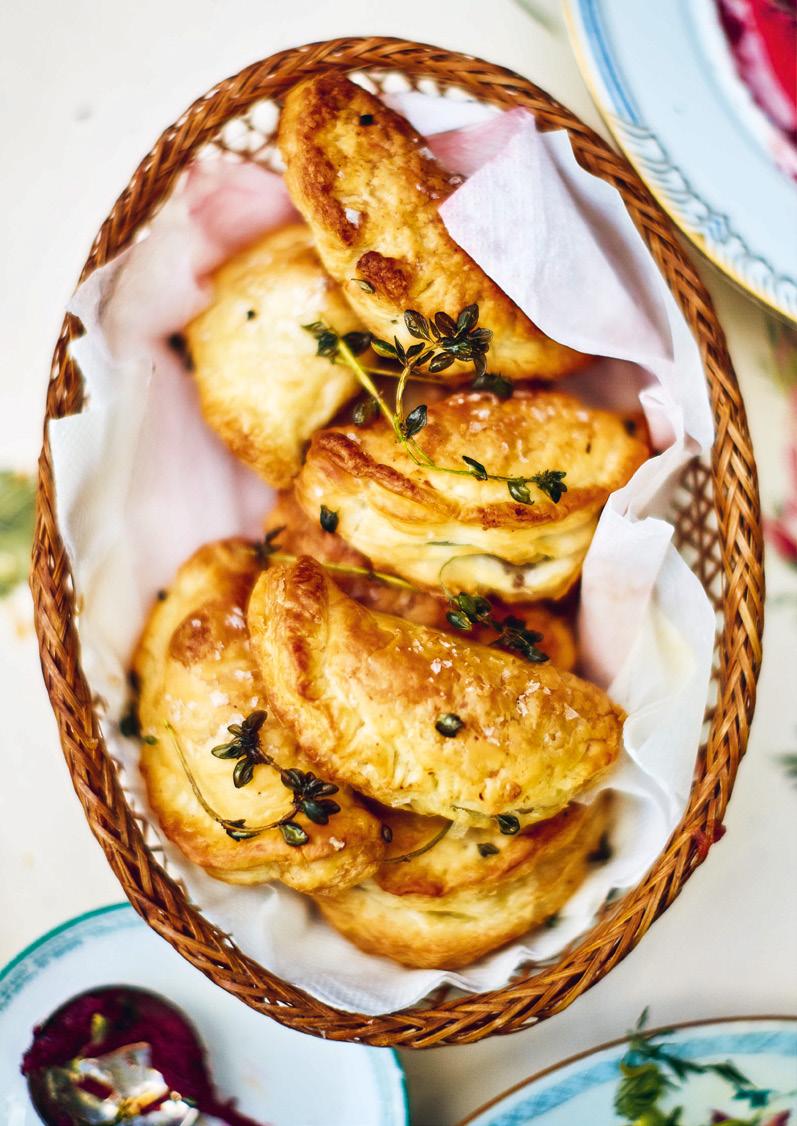
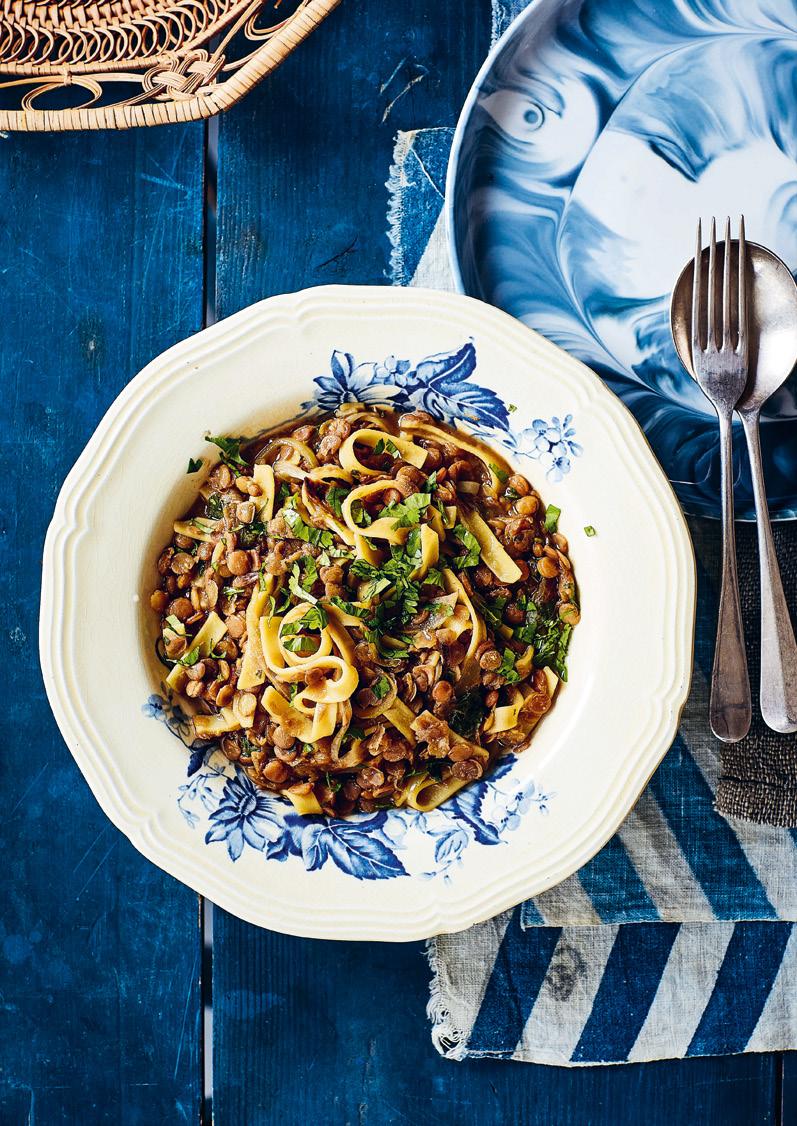
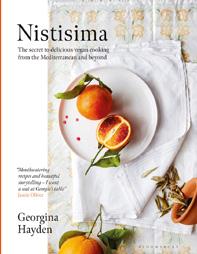
200 g green lentils
1.8 litres hot vegetable stock
2 onions
4 garlic cloves
4 tbsp olive oil
1 bunch of coriander
1 tsp cumin seeds
1 tsp ground coriander
125 g tagliatelle (cooked al dente)
Sea salt and freshly ground black pepper
½ lemon
Big claim time: this Lebanese soup is one of my favourites in the whole book. Having grown up on a diet filled with lentils, I adore them, and the addition of chopped-up pasta makes this soup rich and thick, as the starch gives it a velvety texture. Cumin, coriander, garlic and lemon are the holy quartet of flavours in my world, and the best bit is that this is pretty effortless to throw together. Also, it tastes great the next day. If you try only one of my recipes, make it this one.
Rinse the lentils thoroughly under running water and pick out any stones.
Place them in a large pan with the hot stock and bring to the boil. Reduce the heat to low and simmer for 45 minutes. Meanwhile, peel and finely slice the onions and garlic. Place a large frying pan over a medium-low heat and add the olive oil and sliced vegetables. Sauté for 15 minutes, until softened and just coloured. Finely chop the coriander. Stir the cumin seeds and ground coriander in with the onion and fry for a minute. Stir in half the fresh coriander to the frying pan, fry for a further 2 minutes, then remove from the heat.
When the lentils are ready, stir in the sautéed onion mixture. Roughly tear the tagliatelle into smaller pieces and add to the soup. Season generously with salt and pepper and bring back to the boil. Reduce the heat and simmer for a further 2 minutes. Squeeze in the juice of the lemon half and finish with the remaining chopped coriander before serving.
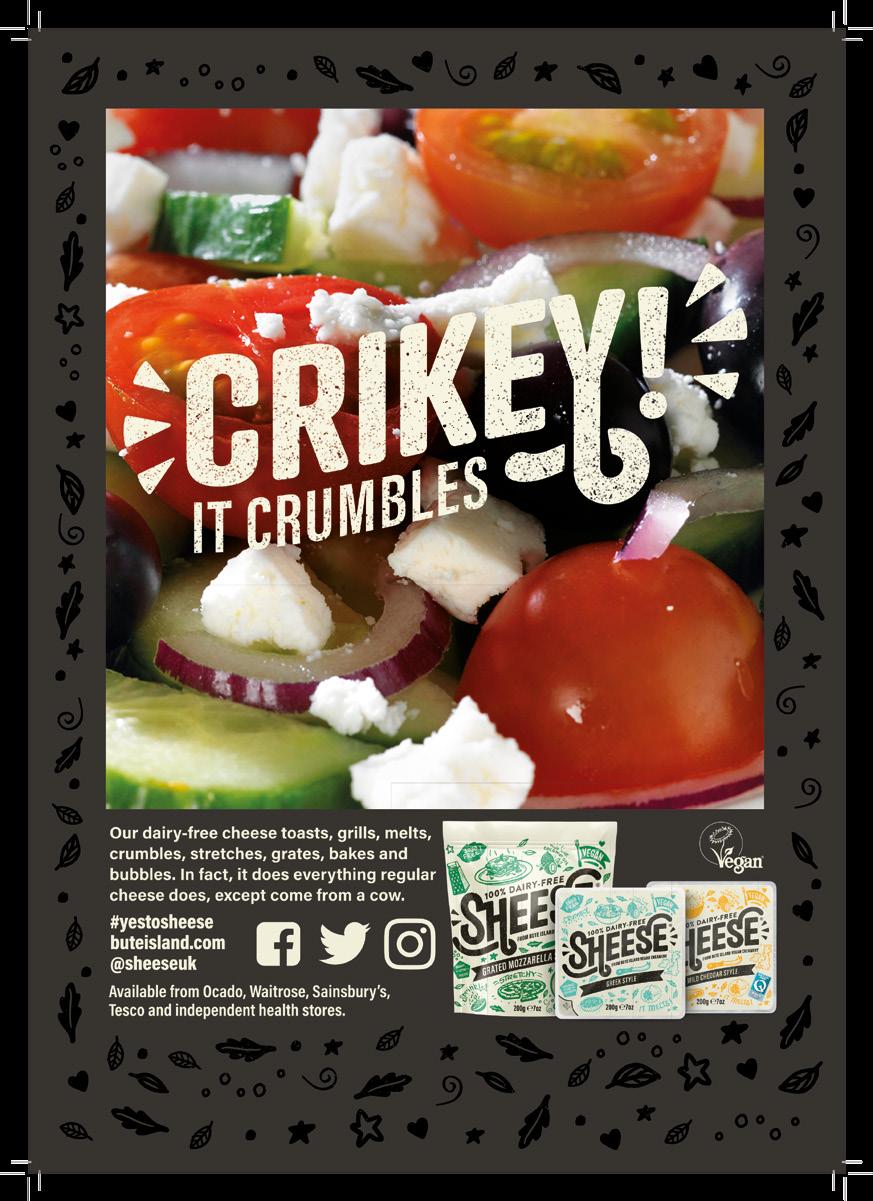

Think Like a Vegan – well, you might assume you already do. But whether you’re a long-time vegan, transitioning, curious, or a devout carnivore, Leese and Charalambides will definitely get you thinking.
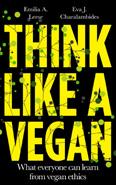
The book is peppered with analogies to make you cringe, but that’s the point: current attitudes towards animal injustice should make us all cringe. An example is their argument that it should not be celebrated to only partially cut back our participation in animal cruelty. They compare this to the absurd notion of indulging in just a little bit of sexism when you fancy it.
Life and death is as all-or-nothing as it gets, but I can’t help but feel this 'you’re with us or you’re against us' mentality risks alienating rather than inspiring flexitarians. That being said, the authors also stress that being vegan is not a claim to perfection, but rather about doing what is possible. Nor is veganism only for wealthy westerners—a misconception problematic on various levels, which I was pleased to see explored here. And importantly, veganism needn’t compete with human rights causes, as we don’t redirect our empathy, but rather extend it.
So what does it mean to Think Like a Vegan? Even as fully signed up vegans, many of us lose that spark that ignited the choice in the first place as it becomes our norm. This book reminds us of the thinking that got us here in the first place. And although this brings discomfort as we question the compromises we make and times we remain silent to
There are many gastronomic gems set within the hustle and bustle of Borough Market. As I slip onto my plush velvet bench in the bright and contemporary Mallow one afternoon, I feel I have found another one.
Wherever possible, Mallow source their ingredients from local, sustainable businesses. They also partner with Plan Zheroes to donate any surplus food to local charities and foodbanks.
Amongst the plates are veg-filled dumplings with kimchi and a spicy-sweet gochujang dip so glorious I could have drunk it straight from the bowl. Another hit was the elegantly layered, soft on the inside, crispy on the outside, potato pave. Served on a luscious bed of red pepper pine nut cream and flawlessly balanced with a piquant artichoke caponata, it was one of the most exquisite vegan mains I’ve ever had.
I didn’t quite feel the same about the pilbil tofu tacos. The tofu was uninspiring and hadn’t been properly pressed. The accompaniments all packed a decent punch of flavour, but the dish on a whole, unfortunately, left me wanting more.
The disappointment of the tofu was soon forgotten when our desserts arrived. Lime meringue pie with lime leaf syrup is particularly worth a mention: perfect, buttery pastry filled with sharp lime curd and finished with a delicate, velvety meringue. I was impressed. The chocolate hazelnut financier with gianduja caramel was, my dining companion exclaimed, the best dessert he’d had this year.
As the first plant-based restaurant in Borough Market and the fine-dining sister to Mildred’s, Mallow has catapulted vegan dining into the mainstream. It’s chic and deliciously modern – even the most staunch carnivores will struggle not to enjoy it.
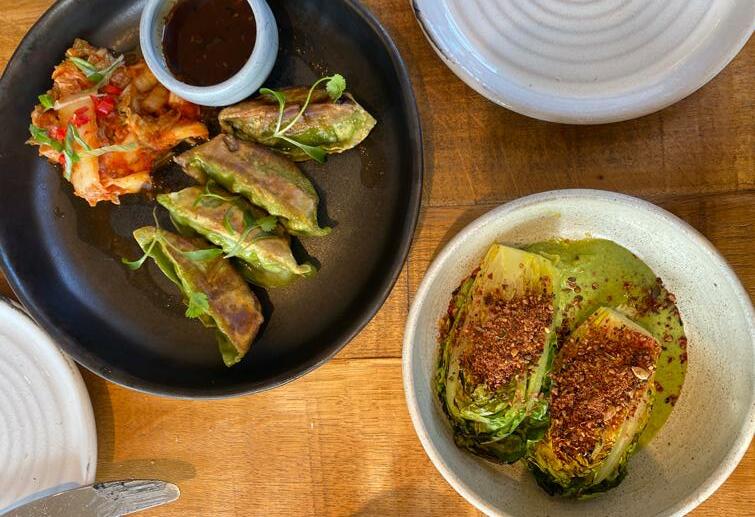
Shop with confidence for products registered with the trusted Vegan Trademark

Why not opt for Gusto Organic’s award-winning colas this summer? Their range of organic and Fairtrade colas are certified vegan and with no phosphoric acid, artificial sweeteners, synthetic caffeine or refined sugar, these sparking drinks are an excellent way to get your vegan cola fix. Blending notes of essential oils with the sweetness of Fairtrade agave and the natural flavour of organic cola nuts, Gusto is bottled in Devon with spring water from the Exmoor Hills. Available at drinkgusto.com or ocado.com


Fill Co are an independent, family-run business in Northamptonshire. They make plastic-free, closed-loop eco laundry, household cleaning and personal care products with biodegradable ingredients. The entire range is Vegan Trademark certified – featured is their Laundry Liquid, Hand Soap and Wash Up, which all come in a variety of unscented and scented options. The range come in 500ml glass bottles or 5L bag-in-box home refills – find your nearest stockist at fillrefill.co/stockists. Available at fillrefill.co

An award-winning salon brand for curly and textured hair, the whole Shedid & Parrish range is certified vegan, natural and scent free and comes in recycled aluminium with direct to bottle printing to minimise waste. This gift range includes a Deep Cleansing Shampoo, Deep Restoring Conditioner, Silky Leave-In Conditioner and three styling products for curls. The range also protects against UV rays, pollution and heat, providing protection for every curl type. Available online at shedidandparrish.co.uk or amazon.com

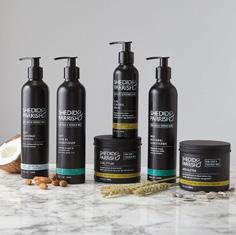
Not only is this sun care range from Green People organic, it’s also suitable for all skin types, including sensitive skin. Green People’s range of vegan sun care products includes Edelweiss Sun Cream with Tan Accelerator, as well as a Scent Free Facial Sun Cream, which gives broad-spectrum protection against UVA and UVB rays. After being out on a sunny day, opt for their Hydrating After Sun, which provides a cooling effect and helps to moisturise and minimise peeling. Available at greenpeople.co.uk, Holland & Barrett and Ocado.
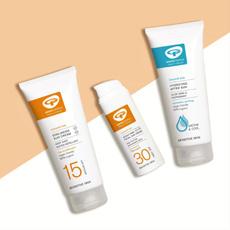
If you’re looking for vegan, organic, nutrient-rich skincare in plastic-free and refillable packaging, then Loopeco is one to check out. A family-run and carbonneutral business, they hand-make all their products in the UK. Featured is the Nutrient Rich Cream Cleanser – a French pink clay cleanser that gently removes makeup; and the Nude Moisturiser – a soothing and gentle hypoallergenic moisturising cream that restores radiance. Available at loopeco.com
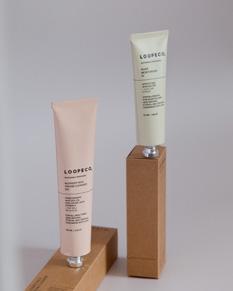
The Tofoo Co has joined forces with the iconic Flying Goose brand to launch Sriracha Tofoo – a spicy twist on a vegan staple. Handmade to a traditional Japanese recipe, the extra firm, chilli-infused tofu block has been marinated in Flying Goose's original Sriracha sauce for a spicy, tangy flavour. Tofoo is made from a recipe using only three ingredients: water, soy beans and nigari – an all-natural extract made from seawater. What’s more – there’s no need to press the tofu, as it comes extra firm. Available at Waitrose and Tesco.
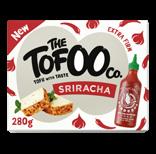
Award-winning vegan brand Moving Mountains is taking BBQs by storm with their gluten-free, vegan Hot Dog. With a naturally smoky flavour, the Hot Dog is made using sunflower seeds and is packed with plant protein and natural ingredients. Sunflower seeds are rich in B complex vitamins, minerals, and are a high source of protein. With a firm texture and great taste, these Hot Dogs are a great addition for your next BBQ in the sun. Available at Ocado, Sainsbury’s, Waitrose and The VeganKind Supermarket.
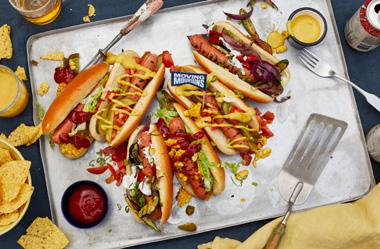
In search of some exciting, refreshing drinks to pair with your next summer garden parties and BBQs? Elan Mocktails’ non-alcoholic drinks are made with natural ingredients and are available in three flavours: Virgin Mojito, Virgin Strawberry Daiquiri and Virgin Pina Colada. Each mocktail is Vegan Trademark certified as well as halal and gluten-free and contains no preservatives or artificial sweeteners or flavours. Available at elanmocktails.co.uk
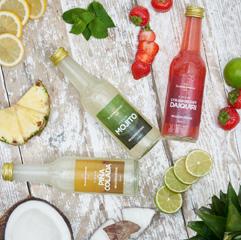
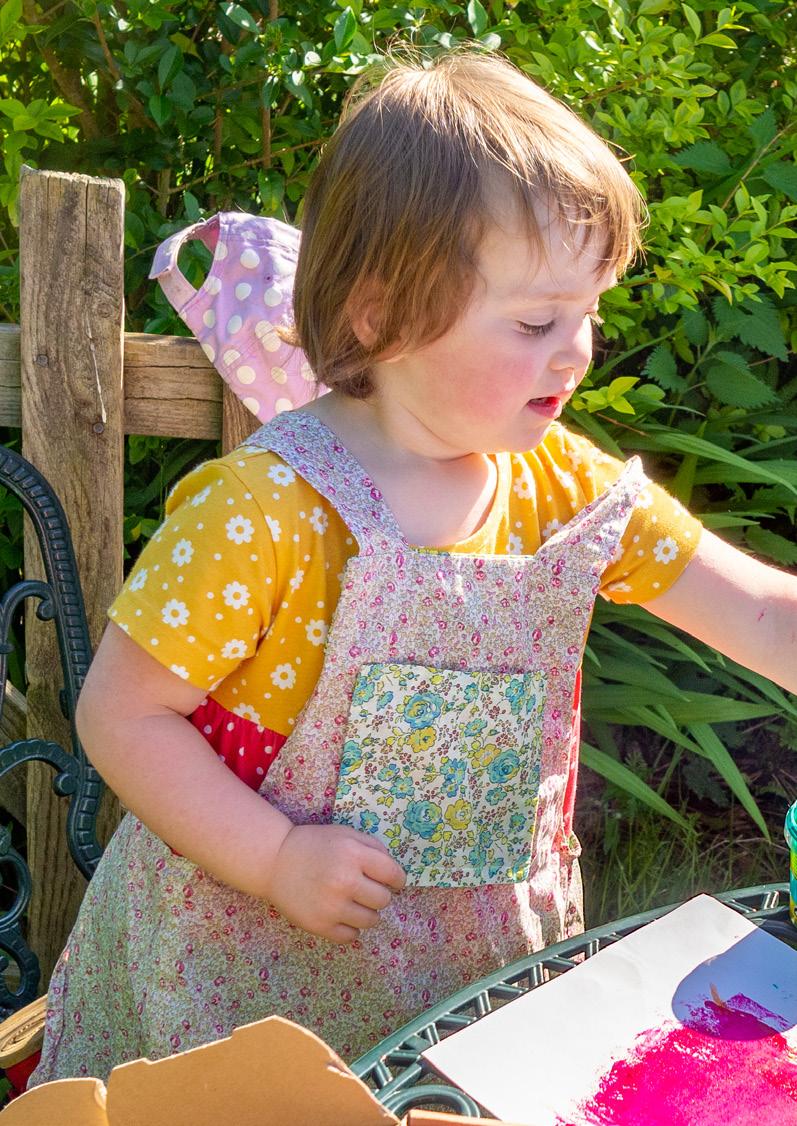
In May 2021, the UK government announced plans to cut arts funding by 50%. Many arts subjects have been removed from the curriculum in favour of apparently more useful STEM subjects (science, technology, engineering and maths). Sadly, the opportunity for young people to make art is being swapped for academic subjects and screen time. I feel it is so important that children and adults engage in tactile activities that enrich us so much mentally and physically.
As a vegan artist I know that creating art without the use of any animal products takes a little bit of research. Unfortunately, it’s not as simple as picking up a pencil and a piece of paper – that pencil may contain beeswax or casein glue (an animal derived protein), and the paper could be coated with gelatine (animal collagen).
It is important to me that the materials I use are reflective of my vegan ethics. I create bold linocut prints that reflect and appreciate the beauty of local nature and our connection to it. I use Brian Clegg water-based ink to print with and for the family-friendly printmaking workshops I run locally in Lancaster. I enjoy demonstrating how beautiful and effective prints can be with vegan inks.
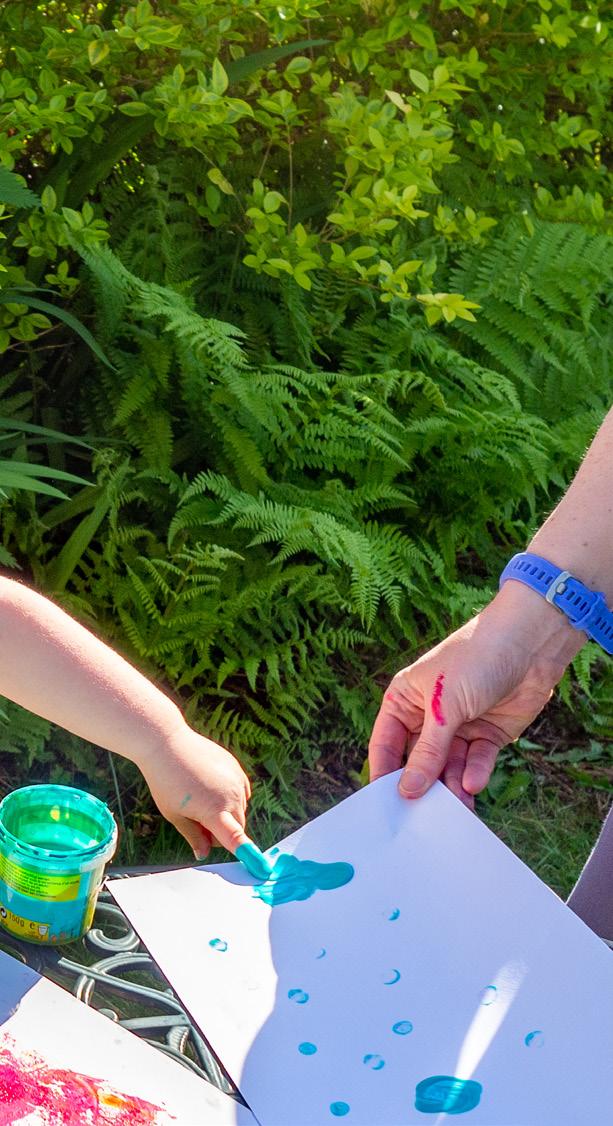
At present, art materials do not fall within the scope of The Vegan Society’s trademark so it’s a lot harder to identify whether products are suitable for a vegan lifestyle. Fortunately, there are other resources out there, which I discuss below.
When buying vegan art products there is a lot of detective work to be done, as long lists of unknown ingredients can be confusing. It almost feels like we need a dictionary with us to understand what all these mystery ingredients are. It is not always obvious to consider that they may not be vegan and that they may be tested on animals.
Although there is now an increased awareness of sourcing cruelty-free art materials, some raw materials are unfortunately still tested on animals even though the products themselves may not be animal-derived. Art Discount, Jackson’s Art and Vegan Womble have made excellent resources for people wanting to buy vegan-friendly products and to find out which ingredients to avoid. It would be great if other art suppliers followed suit to make buying vegan art supplies an easier option.
I’ve been vegan for over eight years, but it didn’t even cross my mind that the Crayola wax crayons I was buying my daughter might not be vegan. There was no mention
Artist Rebecca Lanyon Willmott shares her tips on ensuring your creative tools are free from animal use
Creating art without the use of any animal products takes a little bit of research
of recognised animal-based ingredients on the packet. It was only when I came across the excellent website ‘Double Check Vegan’ that I found out that Crayola wax crayons contain stearic acid which is commonly animal-based tallow.
I have contacted Crayola, but they will not reveal whether the stearic acid is in fact animal-based, due to not wanting to reveal their top-secret ingredients. This is misleading and unfair to people wanting to lead a compassionate lifestyle if in fact the stearic acid is animal-derived. There are many vegan crayons on the market albeit more expensive, but they last longer and are usually of excellent quality. I like Azafran organic crayons from Etsy which have a lovely texture and are easy for little fingers to grasp.
My three-year-old daughter Ayla and I enjoy drawing, painting and just having messy fun together. I have done a lot of research into vegan and environmentally-friendly art materials for our activities. I hope that through arts and crafts and using only vegan materials this will help Ayla understand why we don’t use animal products and help her make ethical and vegan choices as she grows up. We hope our children recognise that we are nurturing a love and respect for animals and the environment in our choice to live a vegan lifestyle and it is one they wish to follow into adulthood.
For painting we use Natural Earth Paint (which is made from natural pigments) and Okonorm finger paints. I really like the website Conscious Craft, which has a vegan-friendly section of its art supplies for children. I have set up an Instagram account @vegantots which is a fun, family-friendly guide to bringing up a vegan family. I often post about the different vegan arts and craft materials we use.
Although I’m a committed vegan and it’s important to me that I live an ethical, cruelty-free lifestyle, there are still surprises I come across. It is crucial to me that materials I use are vegan and eco-friendly and hopefully I inspire others to consider the source of their art supplies. Looking into sourcing vegan art materials I found it quite hard at times to find information about vegan alternatives.
I hope this article provides a useful resource for other creative vegans!
Rebecca is a mother of two vegan tots and lives with her partner and children in sunny Lancaster. You can check out Rebecca’s art @rebeccalanyonart and the vegan-friendly family account @vegantots
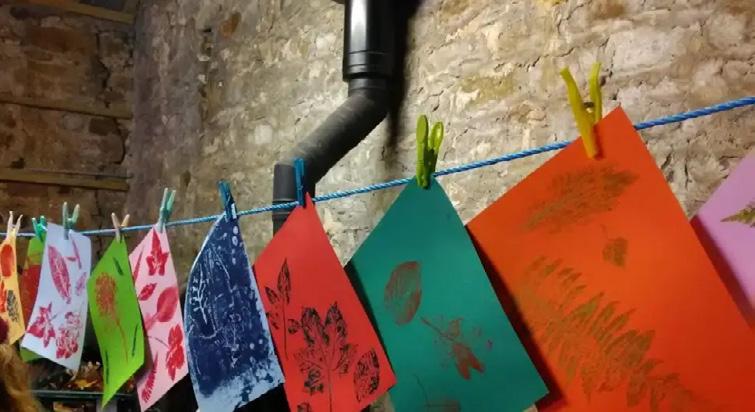
Stearic acid: saturated fatty acid derived from animal or vegetable fats
Ox gall: bile obtained from the gall of a bovine animal
Gelatine: collagen taken from animal body parts
Lanolin: a wax secreted by the glands of woolbearing animals
Casein: milk protein
Cera alba: beeswax (also referred to as E 901)
Seccotine: fish-based glue
Hog or horsehair: commonly used in brushes
Shellac: a residue secreted by the female lac beetle often found in inks
Tempura: egg-based paint
• All Brian Clegg art supplies, paints, inks, markets, oil pastels and adhesives are vegan.
• Fabriano papers
• Derwent pencils
• UHU glues
• Synthetic Pro Arte: Bristlene brushes
• Culture Hustle powder paints
• Azafran organic soya wax crayons
• Natural Earth paint
• Okonorm watercolour and finger paints
• Okonorm chalks
Leaf prints from Rebecca's course
Research for this article was conducted via a variety of sources. The Vegan Society is currently unable to confirm whether any of the above products meet the standards of our Vegan Trademark.
I have set up an Instagram account @vegantots which is a fun, family-friendly guide to bringing up a vegan family
• Faber Castell Polychromos Artists coloured pencil sets • Dr Zigs Bubble Painting Kit • Kitpas Crayons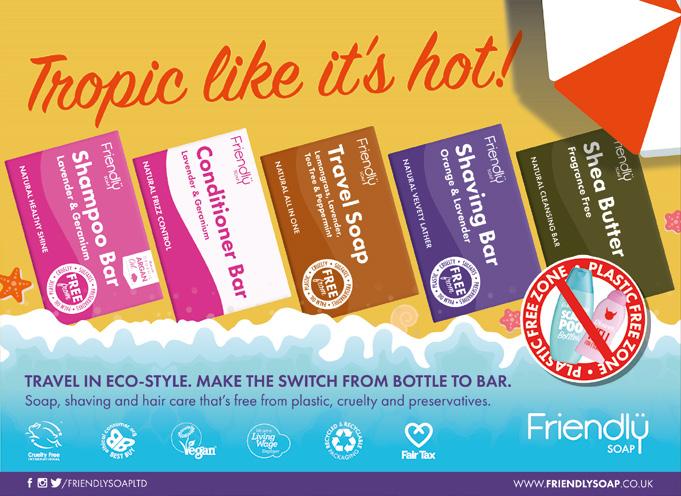
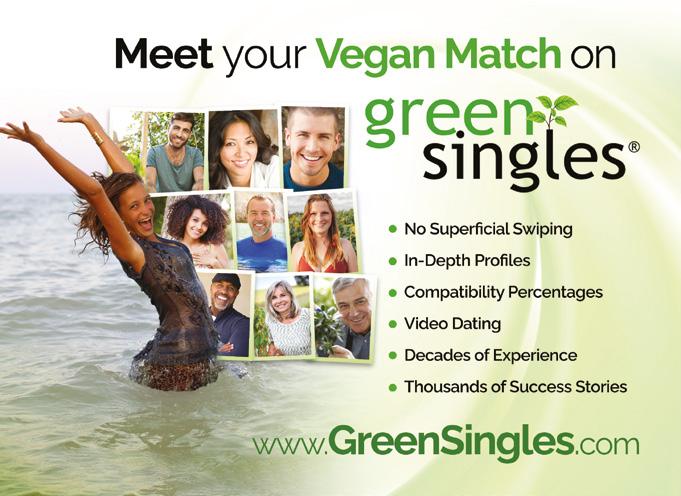
There are few more thrilling encounters than viewing animals flourishing in their natural habitat. These experiences are far more in line with vegan principals than visiting a zoo or aquarium, where animals are deprived of their natural habitat and social structure.
The UK is surprisingly diverse in wildlife and home to over 88,000 different species of animals, plants and fungi – a lot of which can be viewed naturally in woodland, coastland, grassland and even your own garden!
Deep in Tewin Orchard in Hertfordshire lies a majestic badger den, or ‘sett’. From the outside you can see a network of entrances and tunnels that over ten badgers call home. I arrived just before dusk and was met by a volunteer at the nature reserve, who guided me to a wooden hide with a glass viewing window.
Sitting silently as the sun began to set, I saw three muntjac deer playing in the distance, a fox timidly approaching the hide and a couple of pheasants locating their perch for the evening. The moonlit scene welcomed the first badger sighting and out of the bramble came an adorable black and white stripy face which followed a well-trodden path to the outside of the hide. The badger was one of the elders checking the coast was clear for the family and moments after, one by one, more badgers arrived until there were thirteen enjoying an after-dark snack.
A quarter of badgers worldwide live in the UK. Due to habitat loss and badger culls, these beautiful creatures need our help more than ever. Thankfully, we have the opportunity to support them in our own green spaces. Badgers are found across the UK, with the highest numbers in the South of England, and their ideal habitat is a mixture of woodland and open country. Earthworms make up 80% of the badger’s diet along with other invertebrates and fruit including pears, apples, plums and elderberries. Healthy soil and mindful planting in our gardens can go a long way in caring for wildlife on our doorstep.
n the UK we are now in the midst of summer, welcoming long sunny days and a variety of experiences to be appreciated in nature. The UK is brimming with endless flora and fauna experiences waiting to be discovered. Why not search out a badger watching experience near you, and help to support the organisations who care for these wonderful animals’
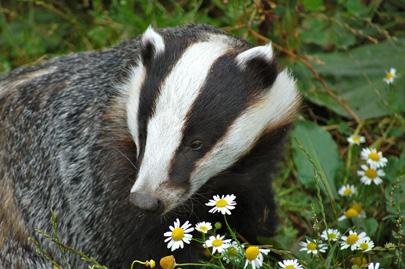
Natalie booked her badger watching experience through the Herts and Middlesex Wildlife Trust. Visit wildlifetrusts.org to find out more.
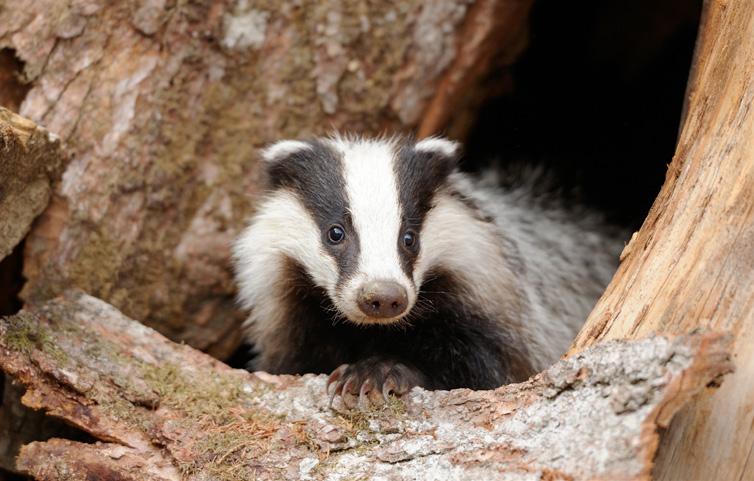
Natalie Swinburne shares her experience encountering these amazing animals in their natural habitat
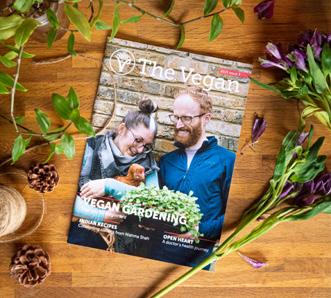
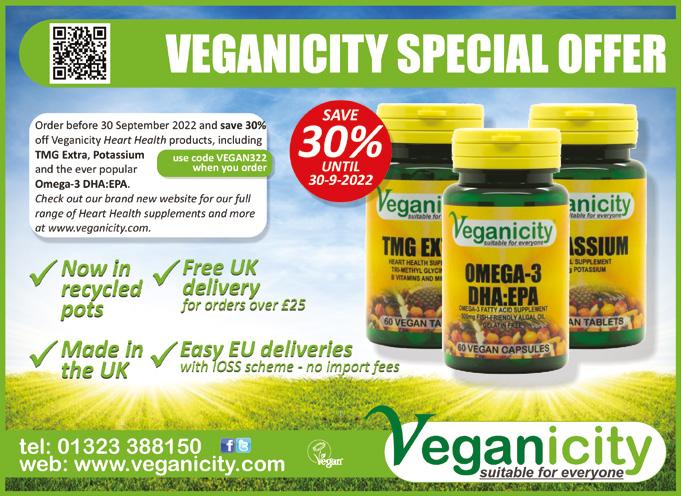
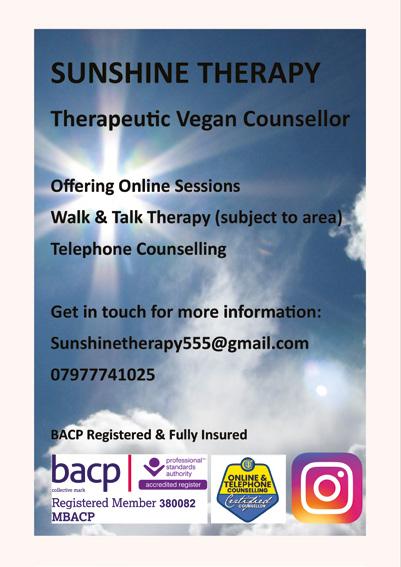

I have just got round to finishing reading the latest issue of The Vegan Society magazine. Please pass on my welcome to your new Dietitian, Chantal Tomlinson. I found their article on Avoiding Food Waste very interesting, well written and extremely informative. It got plenty of information across to this layperson without baffling me with jargon while avoiding talking down to me. The recipe on the following page from Chantal was equally as easy to follow and looks like a tasty meal. Brilliant! Ms Tomlinson is a valuable addition to the Vegan Society Team. - Tom
Congratulations to Forest Green Rovers FC, champions of English Football League Two on goal difference after a dramatic finish to the season. Dubbed ‘the vegan team’ because all catering at their ground, for players, staff and spectators alike, is vegan, FGR have been recognised by the UN as the world’s first carbon-neutral club and described as the ‘greenest team in the world’ by world football’s governing body FIFA. - Paul Appleby
Woody River’s article in Issue 2 on foraging struck a nostalgic and familiar chord. Lecturing in the 1970s/80s I frequently took groups of students out into the Chiltern countryside to teach wild plant identification. Woody’s caution against using identification apps is well-founded; even reliance on a comprehensive guide doesn’t come close to foraging with a competent outdoor field botanist. As we strive for more transitioning away from commercial animal farming, there is the added need for ‘green corridors’ between cultivated land, for the future of wild plants in a natural habitat. These edible ‘gems’, from which many of our present-day crops have been bred, should not be relegated to roadsides where they are polluted by traffic exhausts and herbicide sprays. Green corridors have been well researched and documented, and provide an ecosystem where plants, fungi, insects, wild mammals, invertebrates and soil micro-fauna can co-exist, alongside the prudent forager!
- Kate BowryCongratulations to Kate, who has won a travel selection box from Friendly Soap. Next issue's Star Letter winner will receive an OROMA Body Wash and OKA Body Polish from Naturally Tribal Skincare (naturallytribalskincare.com). Send your letters to editor@vegansociety.com or our usual postal address.

With events well underway for 2022, the Supporter Services team were excited to attend Vegan Life Live in June and enjoyed meeting lots of members. Vegan Society staff members gave talks on vegan policy, activism and school food while Dietitian Heather Russell was on hand to answer questions at our stall. Our quiz, with prizes donated from trademark holders, was very popular too.
We will also be at the following events this year. Please do come and say hello and pick up some trademarked goodies!
OM Yoga Show: 14–16 October, Alexandra Palace London VegFest: 12–13 November, Olympia London
The team is growing Jemma Williams has recently joined the Supporter Services Team and will be helping to answer member queries on the phone, by email and by post. Jemma says, “I am delighted to join the team at The Vegan Society. Veganism is such a huge passion of mine so it’s great to be surrounded by so many like-minded people to work towards a vegan future!”
Twelve candidates stood for five spaces on Council. The successful candidates were Paula Feehan, Donald Lee, Chris McLaren, Peter Smith and Amber Vincent-Prior. We were delighted to have such a competitive election and thank all the candidates who stood for election for their willingness to help the society in this way.
We would also like to thank all the members who were coopted as trustees in 2021 to help with our governance review whose term finished at the AGM: Kamal Adatia, Christine Fraser and Paul Higgins. They were very helpful.
Council motions were successfully passed:
• Appointing a new auditor and authorising Council to set the auditors’ fees
• Appointing Kamal Adatia and Christine Fraser to the Appeals Committee
• Limiting the duration of service for directors/trustees
• Requiring a gap of two years before a former director/ trustee can become an employee or vice-versa
• Requiring a 75% majority of all trustees to either delegate Council powers to a sub-committee or to spend charity funds on complaints against members
A members’ motion to add more in-depth features to The





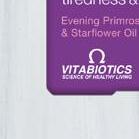

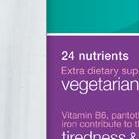
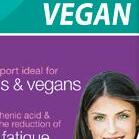


People with ovaries typically experience menopause between the ages of 45 and 55, during which time periods stop. During menopause, low levels of the hormones oestrogen and progesterone increase a person’s risk of certain health conditions. A healthy diet and lifestyle can help to reduce menopause symptoms, maintain or work towards a healthy weight and optimise bone and heart health.

Menopause often comes with symptoms such as hot flushes, night sweats, mood changes, difficulty sleeping and headaches amongst others. Some may decide to use hormone replacement therapy to manage their symptoms. Others find that reducing food and drink high in caffeine such as tea, coffee, and energy drinks can help. Spicy foods and alcohol can worsen these symptoms for some people. Reducing alcohol intake can improve menopause symptoms, however with regards to bone health, a moderate amount may be protective. It’s advised to stay within the government guidelines. There is also some research to suggest that for some people, regularly eating soya products (such as tofu, soya milk and tempeh) can have a small impact on reducing menopause symptoms.
During menopause, some people experience a slower metabolism and reduced muscle mass, leading to weight gain. Maintaining or working towards a healthy weight is beneficial for reducing the risk of high blood pressure, heart attack, stroke and type two diabetes.
Filling half of your plate with vegetables or salad at every meal can aid weight management. Try to ensure that the remainder of your meal contains good protein sources
such as beans, peas and tofu, and starchy foods such as wholegrain rice, potatoes and chapattis.
Menopause can increase risk of osteoporosis, due to less oestrogen in the body. Consuming foods rich in calcium, and getting enough vitamin D, is important. Calcium can be found in fortified plant alternatives to milk and yoghurt as well as calcium-set tofu. A vitamin D supplement of 10mcg is recommended for everyone in the UK from October to March as a minimum – vegan sources include D3 from lichen and D2. Weight bearing exercises with impact such as running, skipping, dancing, aerobics and muscle strengthening exercises such as press ups or weightlifting are also important. Quitting smoking is also a great way to improve your bone health.
Making heart-healthy diet and lifestyle choices postmenopause is vital. Due to the changes in hormones, the risk of developing conditions affecting the heart and blood vessels increases. Here are my top tips for a heart-healthy diet:

• Reduce your saturated fat (unhealthy fat) intake from coconut, shea and palm oils and include more unsaturated ‘healthy’ fats into your diet from peanuts, nuts, seeds, and avocados.
• Aim to have a portion of omega-3 fat such as a tablespoon of chia seeds or ground linseeds (flaxseeds), two tablespoons of shelled hemp seeds or six walnut halves daily. Using vegetable (rapeseed) oil in cooking is also a valuable contribution to omega-3 fats.
• Aim for five portions (or more) of fruit and vegetables a day which provides lots of fibre, vitamins and minerals which help to protect the heart.

• Increase your fibre intake from wholegrains like wholewheat pasta, brown rice, buckwheat and oats instead of refined carbohydrates such as white pasta. Pulses such as

lentils, chickpeas and kidney beans are also great sources of fibre.
It’s important to be mindful to have a healthy diet and lifestyle pre, during and post menopause to help with managing symptoms, maintaining or working towards a healthy weight and reducing your risk of conditions such as osteoporosis
and heart disease. For more information on vegan nutrition, visit vegansociety.com/nutrition. If you are going through menopause and have any particular concerns regarding your diet or treatment options for symptoms, please speak to your GP for personalised advice and a referral to a dietitian.
By Chantal TomlinsonThis recipe incorporates the healthy eating advice for those going through menopause. It is packed full of fibre from vegetables, lentils and wholewheat pasta and contains sources of omega-3 fats. Enjoy!

150 g dried brown lentils
Water as needed
1 onion
3 cloves garlic
1 carrot
1 average-sized courgette
1 stalk celery
1 red pepper
2 tbsp rapeseed oil
1 tsp oregano, garlic powder, onion powder and paprika
4 tbsp tomato puree
1 can chopped tomatoes
500 ml veg stock
1 tbsp brown sugar
1 tbsp reduced-salt soy sauce
60 g walnuts (chopped finely)
480 g (x4 portions) boiled wholewheat spaghetti
Rinse the lentils before placing them in a pan with plenty of water. Leave them to simmer for 30 minutes until the lentils are tender.
While the lentils are cooking, finely chop the onion, garlic, carrot, courgette, celery and pepper.
Heat the oil in a pan on a medium heat. Sauté the chopped vegetables until they have softened.
Mix in the oregano, garlic powder, onion powder and paprika and sauté until combined. Add the tomato puree and sauté for another few minutes.
Stir in the chopped tomatoes, vegetable stock, sugar and soy sauce.
Drain the cooked brown lentils and add to the pan. Simmer the mixture for about 20 minutes until the sauce has reduced and the carrot and courgette are cooked.
Add in chopped walnuts and take the pan off the heat. Serve with spaghetti and enjoy.
Nutritional information per portion
kcal 578 fat 20 g sat fat 2 g carbohydrates 69 g sugar 18 g fibre 16 g protein 23 g salt 1.7 g
Recipe by Chantal Tomlinson, Dietitian


Rollerblading is a niche sport. Could you explain what it is and how you got started?

I would describe it as ‘body communication’ while having skates on your feet. Just put inline skates on your feet and the rest is up to your interpretation. It’s like dancing, playing music or creating art.
My brother Martins started skating after seeing it on TV in 2001. I joined him right after. He has been a big influence and helped me be where I am in my career. He really motivated me to push my boundaries in the early days.
What’s involved in being a professional rollerblader?
I travel to contests, film videos, and make social media content for my sponsors to entertain all the fans and skaters. It’s the best job in the world! I try to remain humble and grateful for this opportunity every day.
It’s a high-risk sport – was it recovery which attracted you to eating plant-based?
I have had a couple serious injuries, including tearing my ACL (a ligament in the knee) twice. Those injuries were turning points in my personal development. I want to feel my best after the next 30 years and still be skating with a smile on my face.
This realisation slowly led to going plant-based and in general making more compassionate choices.
What foods do you prioritise in your diet?
In my view it’s important we are more connected to nature and know where our food comes from, how it’s been produced and who produced it.
That translates to local, seasonal, and fresh whilst keeping in mind what my body needs nutritionally. I love tofu as a source of protein, and I eat oatmeal daily, as well as beans, grain, seeds and nuts. I also enjoy chocolate cake or a donut occasionally.
I can have fresh vegetables from my grandma’s garden. That food is the best for me: it provides the best energy.
It is so inspiring. She grows a lot, including pumpkins, apples, strawberries and pears. It tastes like… you cannot buy that in a supermarket.
My dream is to have my own garden where I can put in all the love and mother nature, God or call it as you wish, can provide me with everything a healthy life needs.
It’s evident you love your country. Describe a perfect first trip to Latvia.
You’d start by flying to Riga, the capital. Taking bikes and just getting lost in the city is the way to go. Riga has great vegan food and coffee. I’m super proud of my friends who opened a bakery, Čau Riga, which is completely local and seasonal.
Luke Harwood interviews pro rollerblader Nils Jansons about skating, compassionate choices and vegan options in his native LatviaThey make the best vegan pizza and tofu in town! Also, Miit Coffee and Kalve are great for food and coffee.
Cesis is a town in Latvia encircled by a national park. You can go on hikes by the Gauja river. Liepaja is a beautiful town by the sea. I’ll be going to Aluksne tomorrow which is a cool little town too and has many lakes around.


My highest priority is taking good care of my body, mind and spirit. In the future I might start my own skating brand to stay involved in the industry.

I want to see inline skating thrive and see young kids experience the beautiful lifestyle I’ve been given the possibility to live.
Go out and have fun. It’s great to find like-minded people to connect with. Skating with friends is the most fun thing. Nowadays there’s a lot of content on YouTube with tips for beginners.
Follow Nils on Instagram @nils_jansons and YouTube at Nils Jansons.
My highest priority is taking good care of my body, mind and spiritNils and his fiancé enjoying an ice swim in Latvia




1 . Which of these facts about sheep is true?
A) A Geesh is the rare offspring of a female sheep and a male goat.
B) Sheep are the only animals beside humans to show same-sex preference for life.
C) A sheep named Olive was the first non-human animal to take to the witness stand in court.
2. Vegans often get asked what they would eat if they were stranded on a desert island, but according to Happy Cow which Caribbean Island has the most vegan-friendly restaurants?
A) Aruba
B) Cuba
B) The Bahamas
In October 2021 The Vegan Society, ProVeg UK, Alpro, Oatly and Upfield launched a new association, The Plant-Based Food Alliance UK. This group formally brings together leaders in the UK’s plant-based food and drink industry for the first time, united in a vision for a fair, sustainable and healthy food system.

In March we brought on our first Plant-Based Alliance Volunteer to support our Senior Insight and Policy Officer Louisianna Waring. Volunteer Martin is working on identifying research to add to a library of scientific evidence that supports our work, and creating a social media content plan for the Alliance Instagram and LinkedIn accounts.
We have recently appointed our first office-based volunteer since before the pandemic. This is an exciting step for the volunteer programme and staff look forward to seeing Nathan, our new archiving volunteer, getting busy in our historical archive.
We’re always on the lookout for new volunteers to join the Community Network, and with two roles available we have some flexibility in when, how and where you get involved.
We’re currently looking for more Advocates to support our Organisers in Aylesbury, Blackburn, Eastbourne, Ely, Glastonbury, Guildford, Hull, Kidderminster, Southampton, St Austell, York and West Norwood. If you live nearby to these towns there is already a friendly and welcoming community for you to join.
We’d also like to find new Organisers for Belfast, Birmingham, Bristol, Cardiff, Edinburgh, Exeter, Glasgow, Leeds, Liverpool, Manchester, Newcastle, Norwich, Nottingham and Plymouth. Despite this, ultimately where you live is not a barrier to getting involved at some level, so if you’re in another area of the UK please do get in touch.
If you have some time on your hands to get more active for The Vegan Society and become part of our local community efforts, then you might find this a very satisfying, inspiring and fulfilling role. Find out more and apply on the volunteer page of our website.
By Kaya Gromocki,Tell us about yourself, Audrey.
I live in Northumberland and work as a freelance proofreader. Up until 2019 I’d worked as a manager of a mental health drop-in centre but felt it was time for a complete change. I felt drawn towards proofreading as I was looking for something where I could work for myself. I found a fantastic training course with the Publishing Training Centre, and at the beginning of 2020 I was thrilled to hear that I’d passed the course and could now start building my own business.

I needed to gain some first-hand proofreading volunteering experience for an organisation/business. The Vegan Society was one of the first organisations to respond to a carefully handwritten introductory letter (with business card) setting out my qualifications and experience and politely asking if they needed a proofreader. I was so pleased when my request was accepted, and that helped to build my confidence and some belief that this proofreading venture may be a possibility. I have a lot to thank The Vegan Society for.
I believe that volunteering is always worthwhile as it is a means to gain experience in an area that you want to get further involved in, as a means of paying back into society and as a useful way to use your spare time. I would encourage anyone to volunteer if they have the time to spare as it is never time wasted.
You must have read some interesting articles as a proofreader. Are there any facts or stories that stand out to you?
The subject areas that I’ve had the opportunity to work on have been very varied. This is delightful from my point of view as it is never repetitive, apart from the actual process of proofreading. The areas I have worked with have covered sociology, the humanities and climate change, amongst many others.
Two jobs that stand out in my business proofreading are one about Persian grammar and one about the political influences in Rimsky-Korsakov’s operas. Both of these were a delight to read as I became so immersed in them for the pure joy as they were both so interesting and the writing itself was so beautiful. In terms of my proofreading for The Vegan Society, the ones that particularly stand out were articles on researching veganism in literary Modernism and vegan for mind and body.
When you’re reading in your own time, what do you enjoy, and do you have any recommendations?
In terms of reading for relaxation, my tastes are very esoteric so it is whatever catches my interest at that time. I have enjoyed reading the Seven Sisters series of books by Lucinda Riley as they have been so varied in location, time period and interesting characters.
Introducing Audrey Anderson, one of our talented proofreading volunteers
Welsh Vegan Festival
Sunday 7 August (10am–5pm)
Tramshed, Clare Road, Cardiff, CF11 6QP welshveganfestival.co.uk/vegan-festival-tickets
North Cornwall Vegan Fair
Saturday 13 August (10:30am–4:30pm)
Ivor Potter Hall entrance, The Parkhouse Centre, Bude, Cornwall, EX23 8LD facebook.com/events/650071109434648
Chester Vegan Festival
Sunday 21 August (10am–5pm)
The Queens Hotel, 52 City Road, Chester, CH1 3AH facebook.com/events/729982034186243
Epsom Vegan Market
Sunday 28 August (10:30am–3:30pm)
Epsom Market Place, Epsom, KT19 8BA ethicalveganevents.co.uk
Cheshire Vegan Fair
Saturday 3 September (11am–5pm)
Sandbach Town Hall, Sandbach, Cheshire, CW11 1AX labl.org.uk/cheshire-vegan-fair
Cirencester Vegan Market
Sunday 11 September (10am–3pm)
Market Place, Cirencester, GL27 2NW veganfairs.co.uk
Reading Vegan Festival
Saturday 17 September (11am–4pm)
Market House, 1-2 Market Place, Reading, RG1 2EZ
European Vegan Summit

Thursday September 15–Sunday September 18
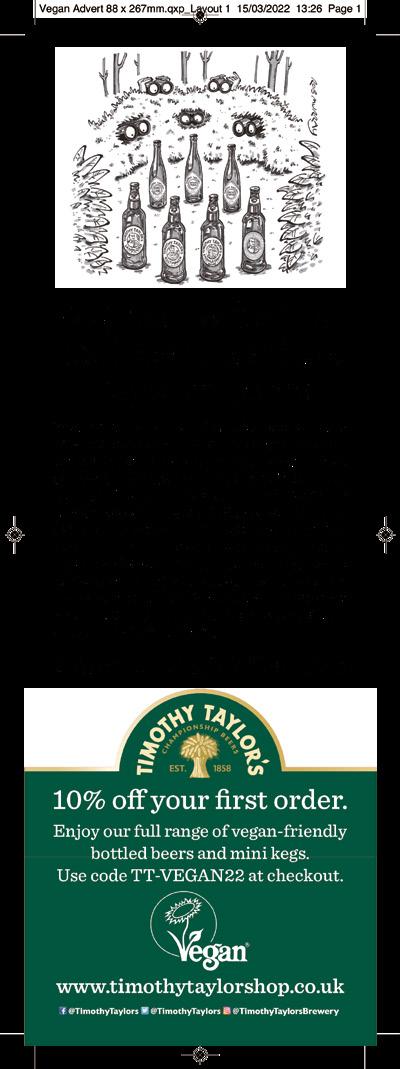
An online event bringing together activists, politicians, business people and academics to discuss human, environmental and animal rights through a vegan lens vegansummit.eu
Walton Vegan Market
Saturday 15 October (9:30am–3:30pm)
Outside the Heart Shopping Centre, New Zealand Avenue, Waltonon-Thames, KT12 1GH
VEG 1: £6.60–£12.70
VEG 1 contains the EU recommended daily Nutrient Reference Intakes of vitamins B12, iodine, selenium, D3, B2 and B6 and folic acid. It is available in orange or blackcurrant flavour, in a 3-month or 6-month supply. Visit veg-1.com to explore the range.

Vegan Society members get 10% off VEG 1! This discount is automatically applied at checkout when you are logged in to the members area, or you can reference your membership when making an order over the phone (0121 523 1730)
In June, VEG 1 celebrated being one year plastic-free
As some of you may remember, in June 2021 we re-launched our VEG 1 multivitamin with plastic-free packaging. Since then, a lot has happened! As we celebrated our one-year plastic-free birthday, we took some time to re past year and would like to share our top three highlights with you.

In the past year since re-launching VEG 1, we have sold just under 144,000 pots. As a result of switching the packaging, we have saved of plastic! For context, that’s roughly the weight of eight polar bears, nine grand pianos
or two and a half medium-sized cars. We’re proud to see the small impact that the packaging of our product is having on the planet, and we’d like to say a massive thank you to everyone who supports vegan health and the work of the society by purchasing VEG 1.
The main driver behind our packaging switch in June last year was to make our product more sustainable. To help us with this journey, we signed up to wherefrom.org. This is a sustainability review platform that allows users to rate products on factors such as packaging, ingredients and quality. Wherefrom recently produced a vitamin and supplements report, and we’re proud to say that VEG 1 was rated the most sustainable supplement product by Wherefrom users. Scores were based on crowdsourced ratings out of ten, and VEG 1 scored nine, topping the leaderboard! Head to our LinkedIn page to see
e have also began selling VEG 1 on Etsy, quickly becoming a bestseller and ‘Etsy’s pick’. Etsy is a much loved platform and for good reason. It’s easy to use and you can ‘favourite’ items to buy later as well as review past purchases. Our hope is that having VEG 1 available to buy on multiple platforms will make it more accessible, so that more and more vegans can reap the nutritional benefits that

